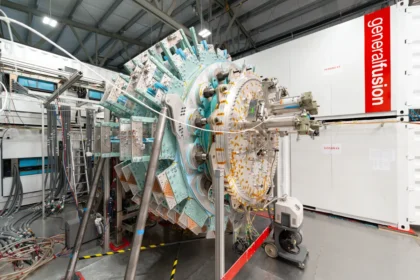The global payments giant just launched its very first data centre on the African continent, and it picked Johannesburg, South Africa, as the launchpad. Think of it as Visa saying, “We are not just wiring money here, we are wiring the infrastructure too.”
The new facility, unveiled today, is not just a shiny new server room. It’s a digital stronghold designed to supercharge everything from transaction speed and cybersecurity to real-time reliability. And while it’s based in South Africa, its reach stretches across the entire continent. But the headline here is not just the tech, it is the money.
Visa has committed a whopping R1 billion (roughly $56.9 million) to boost Africa’s digital growth. That means more support for AI-powered payments, easier access to contactless services, and fresh opportunities for small businesses and job creation across the digital economy.
“This isn’t just about Visa,” said Michael Berner, Group Country Manager for Southern and Eastern Africa. “It’s about building a platform for African growth.”
Berner is not bluffing. The data centre is expected to play a critical role in Visa’s emerging-tech ambitions, including the use of generative AI in payments (because nothing says “future of finance” like bots doing fraud checks faster than you can say “insufficient funds”).
Related: PayPal Opens the Door to Seamless Global Wallet Transfers.
Meanwhile, South African regulators are cheering from the sidelines. Tim Masela of the South African Reserve Bank sees the facility as a clear win for regional integration, especially considering the country’s world-class digital infrastructure, from submarine cables to an increasingly dense fibre-optic network.
And it is not just Visa eyeing South Africa. The country is turning into a data magnet, with Google, Microsoft, Amazon Web Services, and Equinix all bulking up their local infrastructure. Johannesburg is quietly becoming the Silicon Savannah’s server room.
But Visa’s African ambitions do not stop at the tip of the continent.
In March 2025, the company revealed plans to build another data centre, this time in Nigeria. That move is part of a $1 billion-plus investment blitz that includes a $200 million stake in Interswitch and partnerships with digital powerhouses like MoniePoint and ThriveAgric. The goal? Expand financial access for SMEs and smallholder farmers.
In Nigeria, the upcoming centre will bring faster local payment processing and turbocharge mobile payment rollouts through players like Samsung and Hugo. The broader vision: tech that works for the people who need it most.
If South Africa is Visa’s infrastructure HQ, then Nigeria is its fintech playground. Together, these two hubs reveal Visa’s African playbook: Build the rails. Power the trains. Then help local innovators run with it.
This dual-track approach, bricks and bytes, allows Visa to not only comply with local regulations but also enable entire fintech ecosystems to thrive on top of its infrastructure. Let us call it what it is: Visa is not just laying down cables; it is laying down a claim. While many multinationals talk about empowering Africa, Visa is building the tech, putting up the money, and backing startups that can use both.
Visa’s not just processing Africa’s payments, it is processing its future.
With one data centre live and another on the way, the company is not dipping its toes in. It is diving headfirst into the digital wave sweeping across the continent. Can Africa build a payments ecosystem on its terms, with global partners that plug into local priorities? Or is the future of finance still being coded elsewhere?







